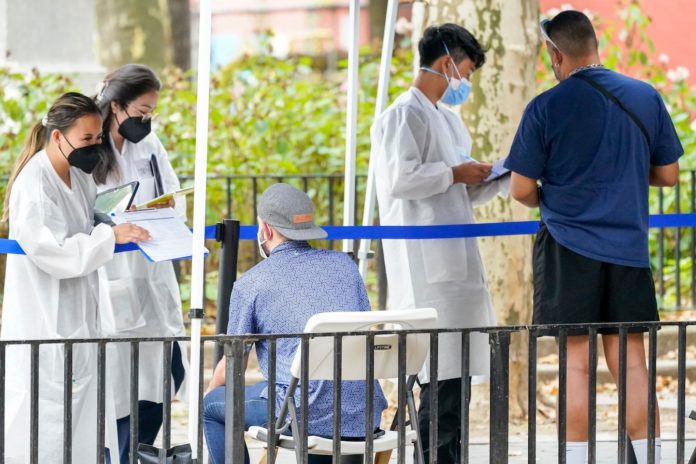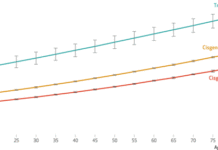
As we’ve learned that monkeypox disproportionately affectsmen who have sex with other men, we’ve seenhomophobic conspiracy theories spread almost more quickly than the virus itself. Right-wing ideologues, including Rep. Marjorie Taylor-Greene (R-Ga.), have falsely labeled monkeypox a sexually transmitted infection — even though the Centers for Disease Control and Prevention has confirmed that sex is just one way the virus spreads. Worse, presented with the fact that some young people have contracted the disease, conspiracists are spreading the heinous fiction that gay men are “grooming” children. Meanwhile, not nearly enough vaccines are being distributed, and CDC officials haven’t always clearly communicated who is most at risk and how they can be protected.
These intertwined failures of messaging and policy raise the question: Does the U.S. have epidemic amnesia? The monkeypox response is following an eerily familiar pattern: Viruses begin in a vulnerable population that people in power don’t feel is worthy of their attention and care. Infected people are stigmatized and their suffering is ignored, allowing the virus to spread. Then, only once it’s affecting broader populations — and thus impossible to contain — do those in power take action.
We can trace this shameful tradition back to the 19th century, when the U.S.failed to prepare for global outbreaks of cholera and smallpox due to a prevailing belief that these diseases affected only “immoral” nations. That sort of belief has allowed nativists throughout history toroutinely stigmatize immigrant groups as carriers of disease. In the 1860s, they blamed the Irish for cholera. Later on, tuberculosis became “the Jewish disease.” By the early 1900s, racism allowed a Bubonic plague outbreak in San Francisco’s Chinatown to spiral out of control. And of course, we saw similar stigmatization in the disgraceful U.S. approach to HIV/AIDS — from President Ronald Reagan’s withholding payments to the World Health Organization, to the cold-hearted laughter in the White House Briefing Room in 1982 when a journalist asked about the government’s HIV/AIDS response.
Even covid-19 was exacerbated by racist scapegoating. First, the Trump administration ignored warnings about the virus for months. Then, after it had spread all over the world, the administration introduced travel restrictions and testing requirements focused exclusively on China. As hate crimes against Asian Americans spiked, President Donald Trump fueled the fire and diminished the crisis by repeatedly calling covid the “Chinese Virus.” By the time the U.S. declared a national emergency on March 13, 2020, thousands of Americans had already been infected, and the virus’s trajectory was out of control.
It’s a lesson we should have learned many times over by now: Any effective response to an epidemic has to begin with leaders stoking compassion and action, not fear or indifference.
Two and a half years into a pandemic, we know the basic steps needed to stop monkeypox’s spread: Make testing and vaccination easy, accessible and free. Allow those infected to properly isolate — monkeypox requires a full three weeks of isolation to prevent spread — by offering financial assistance to those forced to stay home. And, to ensure that at-risk people can take precautions and seek care, message with empathy, urgency and honesty.
We can find ways to be direct about the fact that particular communities are at disproportionate risk without stigmatizing them. When it comes to monkeypox messaging, LGBTQ health and advocacy groups are leading the way, with fact-based campaigns that focus on reaching gay and bisexual men without the alarmist, insensitive tone that so often defines messaging crafted without community input.
We’re already seeing how empathetic, intra-community messaging can lead to improved health outcomes. Jason Cianciotto, a vice president of Gay Men’s Health Crisis, finds hope in the fact that when thousands of vaccine appointments were made available in New York, they filled up in a matter of hours. “When you equip people with the information they need to make healthy choices for themselves and for their community, and when you help them approach those decisions with self-love and acceptance, it’s amazing what the community is able to achieve,” Cianciotto said in NPR’s Weekend Edition.
Still, as admirable as the efforts by activists and nonprofits have been, they shouldn’t be leading this fight alone. New York City Councilman Erik Bottcher, who represents some of the neighborhoods most affected by monkeypox, is seeing the consequences of the failed federal response firsthand. “We have been forced to do this for so long, we have been forced to fight for our own health care when we got let down by the government,” he said . “Shame on the government for letting us down again.”








